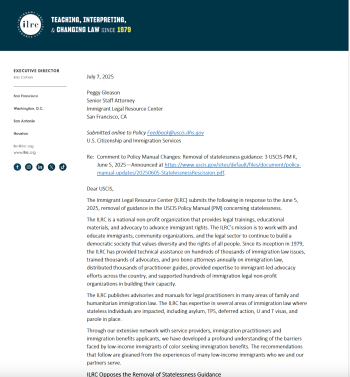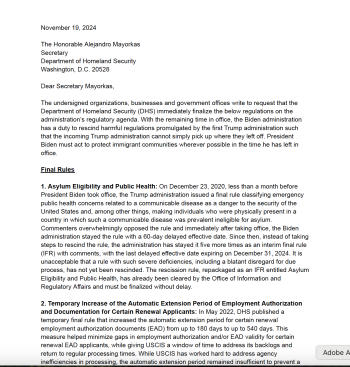Term Page
Asylum Path Fragment
community
On May 5, 2025 the ILRC submitted a comment opposing a proposed U.S. Citizenship and Immigration Services (USCIS) rule that would require immigrants to disclose their social media identifiers on application forms.
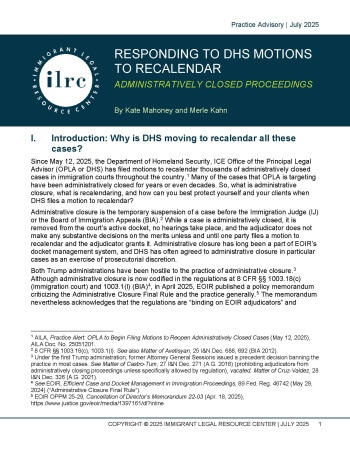
In recent months, the Department of Homeland Security has begun filing thousands of motions to recalendar administratively closed proceedings. This trend is raising questions about how attorneys and accredited representatives can respond to these motions and protect their clients’ interests, particularly in cases that have been administratively closed for many years. This advisory explores those questions and offers strategy considerations when determining how to proceed in each case.
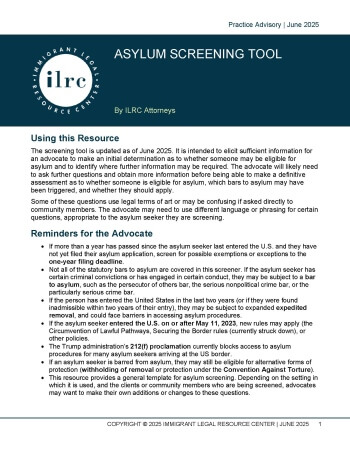
This tool offers a template that practitioners can use to help identify possible asylum eligibility. The screening questions are intended to elicit information about the basis of an asylum claim, identify possible bars and challenges, and flag areas where further follow-up may be needed. Accompanying the screening tool are some notes to help guide practitioners in assessing relief and spotting potential issues.
The Trafficking Victims Protection Reauthorization Act of 2008 confers initial jurisdiction over asylum claims filed by unaccompanied children (UCs) to the asylum office. The Board of Immigration Appeals’ decision in Matter of M-A-C-O-, along with policy changes implemented during the first Trump administration, sought to strip away this crucial protection from many child asylum seekers. Because of these changes and legal challenges by immigrant youth advocates, the current landscape of initial UC asylum jurisdiction has changed. This practice advisory provides an overview of the current state of UC asylum jurisdiction following the Matter of M-A-C-O- decision and the outcome of the JOP v. DHS litigation. It also offers some arguments and practical tips to help practitioners advocate for their UC clients to receive the statutory protections afforded by the TVPRA, as well as the benefits from the JOP v. DHS litigation.
The Trump administration’s Registration requirement for most undocumented immigrants is another hateful tactic in its campaign to cause panic and fear throughout the country. The Department of Homeland Security (DHS) has been clear that the central purpose of Registration is to gather information about all noncitizens and use this information to locate, apprehend and remove them as quickly as possible. The new registration requirement took effect April 11, 2025.
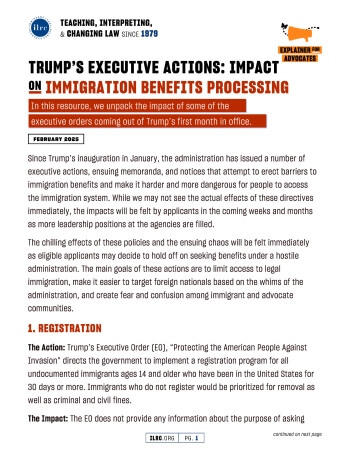
In its first month, the Trump administration has issued dozens of executive orders (EO) that seek to limit access to the immigration system, target foreign nationals for political gain and sow chaos and fear among immigrant and advocate communities. This explainer focuses on aspects of the EOs that target immigration benefits, processing and adjudication.
When the first Trump administration took office in 2017, it immediately adopted restrictive policies on asylum, making it more difficult for asylum seekers to win their cases. Trump returning to office in January 2025 raises fears that asylum-seekers will once again be a focus of the administration’s anti-immigrant policies. Although the new administration will likely enact policies that are harmful to asylum seekers, certain changes would require Congressional action. Moreover, executive actions on asylum could be challenged in court. This alert explores what a second Trump term could mean for asylum seekers and what the administration can, and cannot, change on its own.
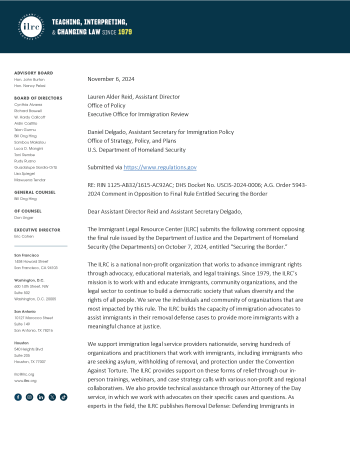
On November, 7, 2024, the ILRC submitted a comment on the final Securing the Border rule. ILRC had submitted comments on the interim final rule in July 2024, and reiterated our strong objections raised in that comment. The ILRC further objected to the inclusion of unaccompanied children in the threshold count for lifting the border restrictions and the expanded applicability and geographic reach of the Circumvention of Lawful Pathways rule.
